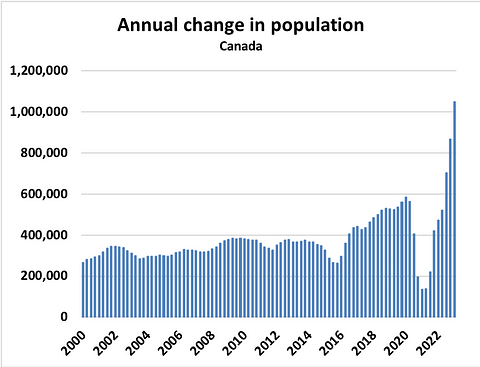|
Just a few short months after coming into effect, the foreign buyer ban is already undergoing amendments and new loopholes around the current conditions.
Why? Because the new law prevented many developers from acquiring residential land for the purpose of building new housing supply. Many local developers are private corporations with non-Canadian equity partners and any developer with more than 3% of its corporation controlled by a foreigner was prevented from acquiring new land to develop housing. In other words, you’re a local Vancouver developer but your capital partner in the US who controls part of the company prevents you from building purpose-built rental condos. New housing supply would be stagnated by this bill as a result, not ideal with over one million new immigrants flooding into the country in 2022.
Meanwhile, the immigrants we’re asking to come here and fill job vacancies and work a lot of these low paying jobs are not allowed to purchase housing, instead they must compete in the incredibly tight and undersupplied rental market.
Foreign Buyer Ban Amendments include:
- increasing the corporate foreign control threshold from 3% to 10%
- allowing the purchase of vacant land
- Work permit holders will now be able to purchase one residential property, assuming they have 183 days or more of validity remaining on their work permit or work authorization at time of purchase.
-
The Federal Government dropped the updated budget recently as well. The Budget plans for $43B of more spending over the next six years - which includes the current $67B of spending over the next 5 years.
Scotiabank's chief economist, Derek Holt, shared his thoughts on Canada's recent spending habits and the resulting implications:
“There are macroeconomic distortions stemming from all of this spending that include but are not limited to the following and that follow from yesterday morning’s note:
- it has contributed to some of the inflationary pressures that represent a highly regressive tax on lower and middle income Canadians while nevertheless transferring seigniorage revenues. They are being helped with one hand and hit with the other.
- it has contributed to a higher BoC policy rate than would otherwise be the case.
- it has contributed to worker shortages as public sector jobs are up 420k since just before the pandemic and account for 51% of all jobs created in Canada over that time. No wonder businesses are struggling to find workers!!
- it has contributed toward higher wage pressures and imo some of the productivity problems in this country where public policy has emphasized the body count in job markets over what is produced by whom.
- it has worsened competitiveness problems through spending that is primarily focused upon redistributive social transfers.
- In a broader public policy sense, Ottawa’s housing strategy remains confusing. The BoC is trying to contain inflationary pressures and soften previously raging house prices. The Feds have thrown open the immigration doors into a market with no supply while another tax subsidy to housing starts up on Saturday in the form of the 1st time homebuyers tax-free home savings account that allows one to shelter up to $40k tax free with annual contributions of $8k. Housing is going to rip after a temporary retrenchment and there goes the BoC’s efforts.
In all, I’m not impressed. This budget adds to macroeconomic imbalances and divides folks at a time when unity is needed to address the country’s challenges. Governments did a fantastic job in the early days of the pandemic. The problem is that they are now addicted to high spending and delivering divisive jabs at certain interests. Nothing is being done about productivity and competitiveness pressures that are mounting year by year. Big spending, big deficits, big debt, high taxes, high inflation and bond market challenges are not the path to prosperity.”
|











